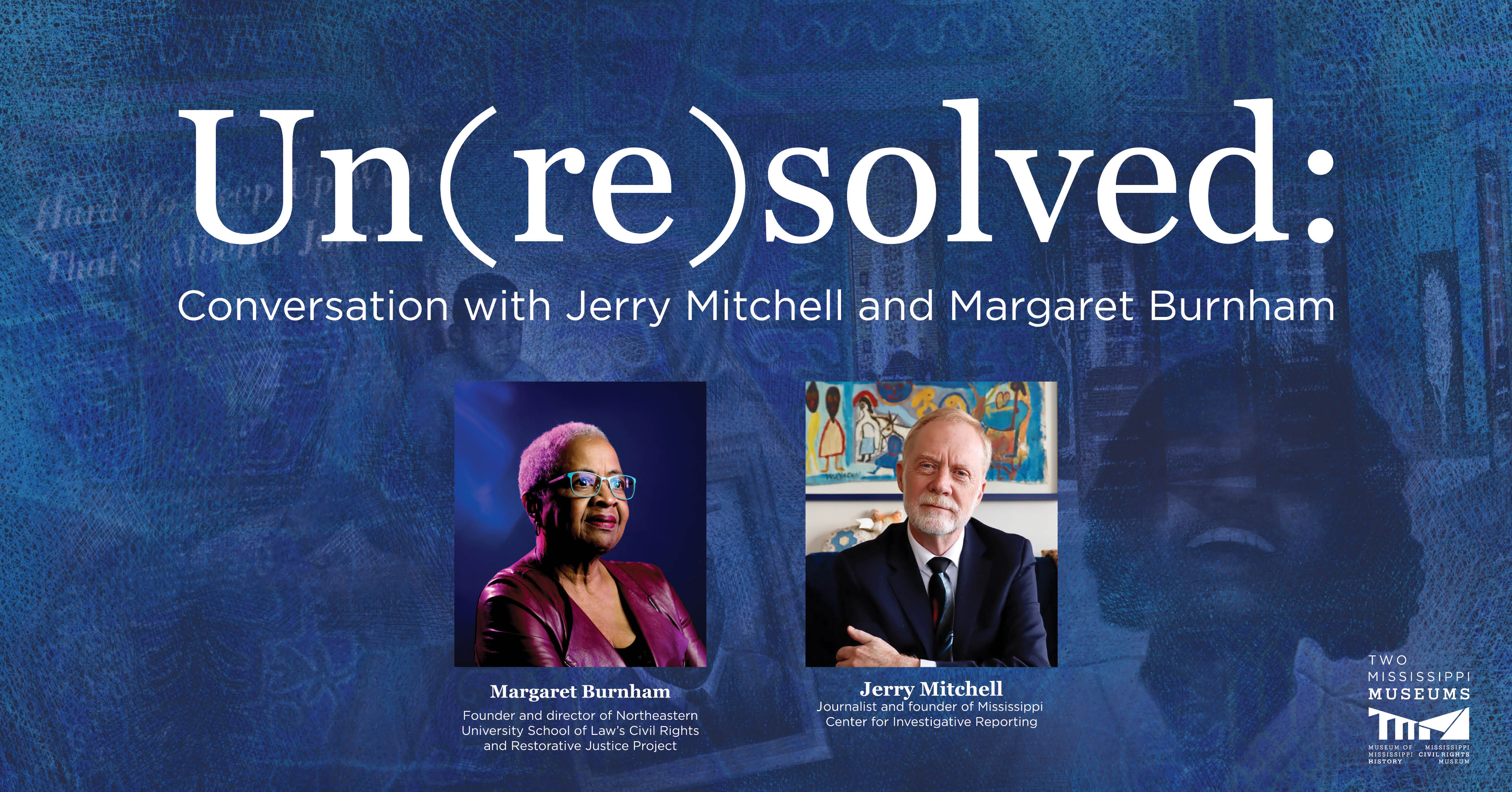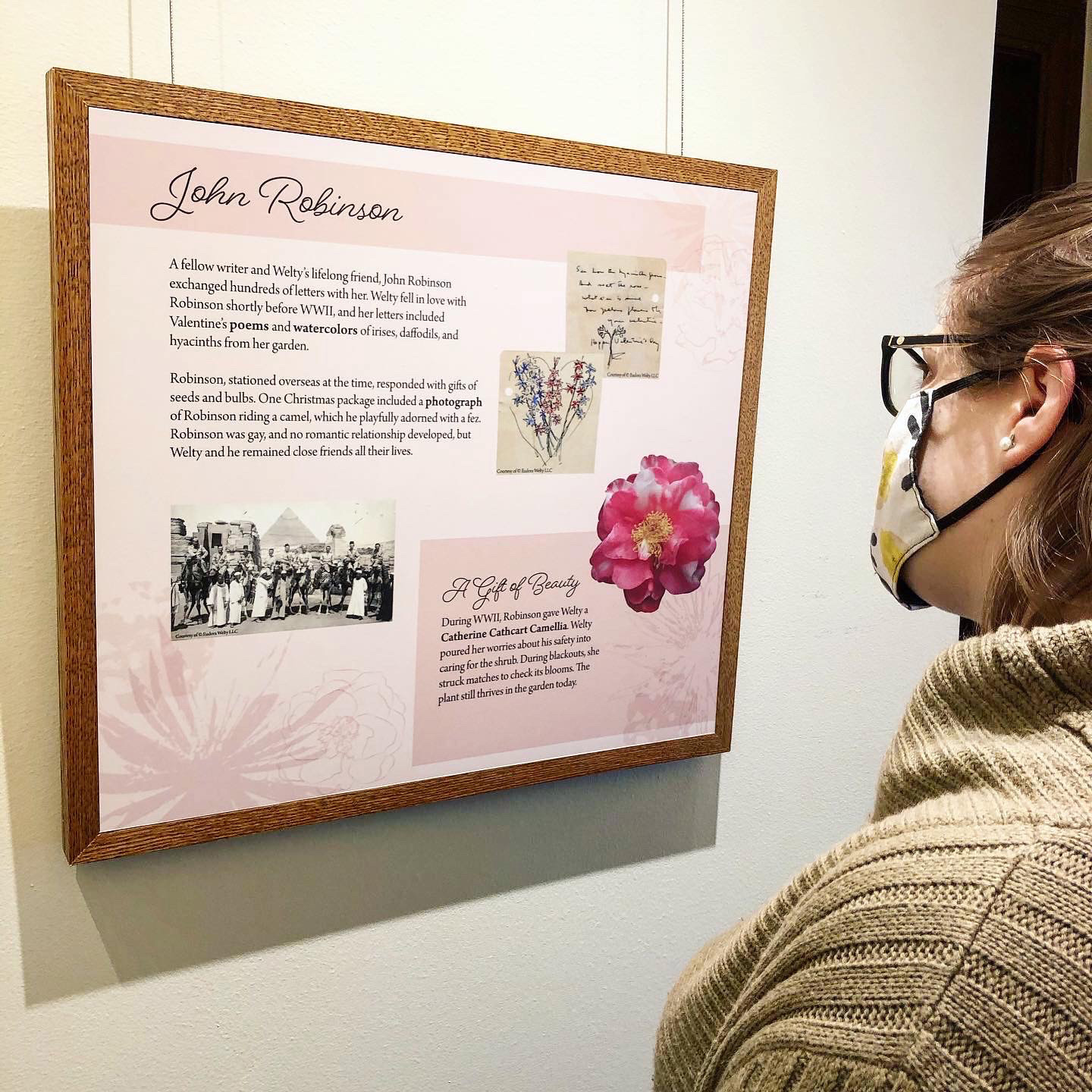The Negro Motorist Green Book Exhibit Opening
The Negro Motorist Green Book special exhibit, created by the Smithsonian Institution Traveling Exhibition Service (SITES), will open at the Two Mississippi Museums. Click here for more information.
The Negro Motorist Green Book special exhibit, created by the Smithsonian Institution Traveling Exhibition Service (SITES), will open at the Two Mississippi Museums. Click here for more information.
MDAH museums, sites, archives library will be closed on Monday, February 21, in observance of President’s Day.
Visit www.mdah.ms.gov/explore-mississippi for more information about each site. Learn more about researching at archives here.
On Friday, December 3, enjoy free live music, holiday decorations, and treats during the 2021 Christmas by Candlelight Tour. In addition to the traditional features of the tour—shuttle buses, model train exhibit—this year's event will coincide with the City of Jackson's Capital City Lights, the kickoff event of the city's year-long bicentennial celebration.
The Mississippi State Capitol and four MDAH sites will be open and sporting holiday decorations: the Mississippi Governor's Mansion, the grounds of the Old Capitol Museum, Museum of Mississippi History, and the Mississippi Civil Rights Museum.
Park and take advantage of the shuttle buses running between sites, walk or drive and come and go on your own schedule. The Candlelight tour takes place from 4 p.m. until 8 p.m. Capital City Lights will continue with additional activities, including shopping at two outdoor markets, Magnolia Marketplace and JXN Flea, classic cars, emergency vehicles set up in touch-a-truck style, live music, hot chocolate, caroling, marching bands, holiday décor, and of course…LIGHTS!
Governor Tate Reeves and First Lady Elee Reeves will welcome visitors to the Mississippi Governor's Mansion, along with Santa. The model town of Possum Ridge and its trains will be displayed on the second floor of the Two Mississippi Museums—the Museum of Mississippi History and Mississippi Civil Rights Museum—and the Mississippi Museum Store will be open. The museums will also feature a sixteen-foot Christmas tree. The Old Capitol Museum will be decorated and lit, and choirs will perform on the grounds. A jazz ensemble will perform at the Mississippi State Capitol, which will be decorated and open for tours.
On November 28, 1821, the Mississippi Legislature designated LeFleur's Bluff as the site of the state capitol. Jackson's first map was completed in April 1822 and consisted of the areas between High and South Streets and between Jefferson and West Streets.
The legislature incorporated the town and named Jackson the county seat of Hinds County in 1822. The Mississippi Legislature first met in Jackson on December 23, 1822 in a nonextant structure. In 1839, legislators began convening in a newly-built statehouse, which now serves as the Old Capitol Museum. The current Mississippi State Capitol was completed in 1903.
The Capital City Lights planning committee consists of members of City of Jackson, MDAH, GJAC, Visit Jackson, Downtown Jackson Partners, local hoteliers, retailers and residents.
For more information about the Christmas by Candlelight Tour, call 601-576-6850 or email info@mdah.ms.gov. For more information about Capital City Lights, email J. David Lewis at jdlewis@city.jackson.ms.us.
Spend a day as an archaeologist at the Two Mississippi Museums! Learn how to clean authentic artifacts excavated in Mississippi, view different aspects of Native American culture, try your hand at reconstructing a broken modern vessel, use stone tools to shave a deer hide, and learn more about the early peoples of Mississippi through guided tours of archaeological exhibits in the Museum of Mississippi History. For more information, visit the Museum of Mississippi History Facebook page.

On Tuesday, October 19, The Two Mississippi Museums will host Un(re)solved: Conversation with Jerry Mitchell and Margaret Burnham to discuss the civil rights cold cases highlighted in Un(re)solved—the PBS Frontline traveling augmented-reality exhibit at the Two Mississippi Museums. The event will start at noon and is free and open to the public. It will also be live streamed via the Mississippi Civil Rights Museum Facebook page. Margaret Burnham is the founder and director of Northeastern University School of Law’s Civil Rights and Restorative Justice Project (CRRJP), and Jerry Mitchell is a renowned investigative reporter.
Margaret Burnham and the CRRJP investigate racial violence in the Jim Crow era and other historical failures of the criminal justice system, including Franklin County Mississippi law enforcement officials accused of assisting Klansmen in the kidnapping, torture, and murder of Henry Dee and Charles Eddie Moore in 1964. Burnham is lead advisor for Un(re)solved, and her investigations are featured in the documentary American Reckoning.
Jerry Mitchell has been investigating civil rights-era crimes for more than thirty years and he is the founder of the Mississippi Center for Investigative Reporting. Mitchell’s reporting helped lead to convictions in cases such as the 1963 assassination of Mississippi NAACP leader Medgar Evers, the 1963 16th Street Baptist Church bombing, and the 1964 slayings of three civil rights workers, James Chaney, Andrew Goodman, and Michael Schwerner. Mitchell served on the advisory council that helped guide the development of the Unresolved project.
Un(re)solved, PBS Frontline’s traveling augmented-reality exhibit, is now open at the Two Mississippi Museums and will run through October 24. Drawing on more than two years of reporting, thousands of documents, and dozens of first-hand interviews with family members—as well as current and former Justice Department and FBI officials, state and local law enforcement, lawmakers, civil rights leaders and investigative journalists—the multi-platform exhibit examines the federal government’s effort to investigate more than 150 civil rights-era cold cases through the Emmett Till Unsolved Civil Rights Crime Act.
Join us for an evening of history and fun at the Two Mississippi Museums! This edition of History Happy Hour highlights photography and features the protest artwork of civil rights activists in the I AM A MAN: Civil Rights Photography in the American South, 1960–1970 special exhibit. Guests will engage in interactive flash tours through the exhibit and the museums about the significance of photography in Mississippi history.
 The Eudora Welty House & Garden will launch a new outdoor audio tour on Tuesday, April 13, in recognition of Eudora Welty’s birthday. The Welty Garden Audio Tour interprets the history of Welty’s garden and its influence on her writing.
The Eudora Welty House & Garden will launch a new outdoor audio tour on Tuesday, April 13, in recognition of Eudora Welty’s birthday. The Welty Garden Audio Tour interprets the history of Welty’s garden and its influence on her writing.
“We are excited to offer our visitors an audio tour of the Welty garden,” said Katie Blount, director of the Mississippi Department of Archives and History (MDAH). “To hear Mary Alice Welty White read her aunt’s words about the flowers she and her mother nurtured adds an intimacy to the garden tour, which is closer now to the experience of walking through her house.”
The twenty-minute tour includes music, nature sounds, and narration read by retired Welty Garden curator Susan Haltom. The audio tour is available for listeners online at https://welty.mdah.ms.gov/visit/audiotour.
The new exhibit A Parade of Bloom: Stories From the Welty Garden is now open to visitors at the Eudora Welty House & Garden Visitor Center and highlights the importance of gardening in Eudora Welty’s family and social life as well as her literature. The exhibit includes photographs of Welty’s family in the garden, artifacts, garden maps, flower sketches, and journals. Visitors also can learn about featured camellias in the garden and their importance in several of Welty’s friendships. The Visitor Center is free and open to the public Tuesday–Friday, 9 a.m.–4 p.m. and Saturday 12:30–4 p.m.
The Eudora Welty House & Garden interprets the life of the internationally acclaimed author. Tours are by reservation Tuesday–Friday, 9 & 11 a.m. and 1 & 3 p.m. and Saturday, 1 & 3 p.m. To reserve a tour, email info@eudoraweltyhouse.com or call 601-353-7762. The Eudora Welty House & Garden is located at 1119 Pinehurst Street in Jackson and is operated by MDAH.
 The Mississippi Department of Archives and History (MDAH) has created a new website that prioritizes the repatriation of human remains and cultural items in the department’s archaeological collection. The website will inform the public about the Native American Graves Protection and Repatriation Act (NAGPRA) and serve as a virtual platform for consultation with the department’s federally-recognized Tribal partners.
The Mississippi Department of Archives and History (MDAH) has created a new website that prioritizes the repatriation of human remains and cultural items in the department’s archaeological collection. The website will inform the public about the Native American Graves Protection and Repatriation Act (NAGPRA) and serve as a virtual platform for consultation with the department’s federally-recognized Tribal partners.
The website features NAGPRA collections updates, policies and procedures, and links to more information about the department’s Tribal partners. An interactive map shows the status of ongoing repatriations in Mississippi counties across the state. MDAH completed its first repatriation earlier this year.
The Choctaw Nation, Chickasaw Nation, and Muscogee (Creek) Nation generously provided images featured on the website. The Coushatta Tribe of Louisiana provided additional content.
“Our goal is to engage the public in NAGPRA and to provide information about our collections in a way that hasn’t been done before,” says Meg Cook, director of archaeology collections. “The most important part is remembering that these remains are people, and their families want to see that they are reburied.”
The website will feature internship opportunities, Tribal stories, collections updates, and repatriation progress. For more information visit the website at http://nagpra.mdah.ms.gov/.
On Thursday, April 1, the historic section of the Mississippi Governor’s Mansion will reopen to the public for guided tours. Free guided tours will be offered Tuesday through Thursday at 9:30 a.m., 10 a.m., and 10:30 a.m. Reservations are mandatory and must be made at least seventy-two hours in advance.
“After a long year filled with many challenges, we are so excited to resume tours at the Governor’s Mansion,” said First Lady Elee Reeves. “We look forward to seeing everyone who comes to visit Mississippi’s home! It is our hope that each of you will come learn more about this historic home, and grow to love it as much as we do.”
To make a reservation, email the curator at mansiontours@mdah.ms.gov or call 601-359-6421. As a precaution, a maximum of ten visitors per time slot will be allowed in the mansion and face coverings will be required.
The Mississippi Governor’s Mansion, a National Historic Landmark, is administered by the Mississippi Department of Archives and History. First occupied in 1842, the Governor's Mansion is the second-oldest continuously occupied governor's residence in the United States.
The Greek Revival building was designed by William Nichols, an English-born architect who also designed the Old Capitol. The mansion was renovated in 1908–09, then underwent a renovation and restoration in the 1970s that included the acquisition of appropriate antique furniture and accessories to furnish the historic interior.
For more information email mansiontours@mdah.ms.gov.
Admission to the Museum of Mississippi History and the Mississippi Civil Rights Museum is free every Sunday. This includes admission to the Solidarity Now exhibit.